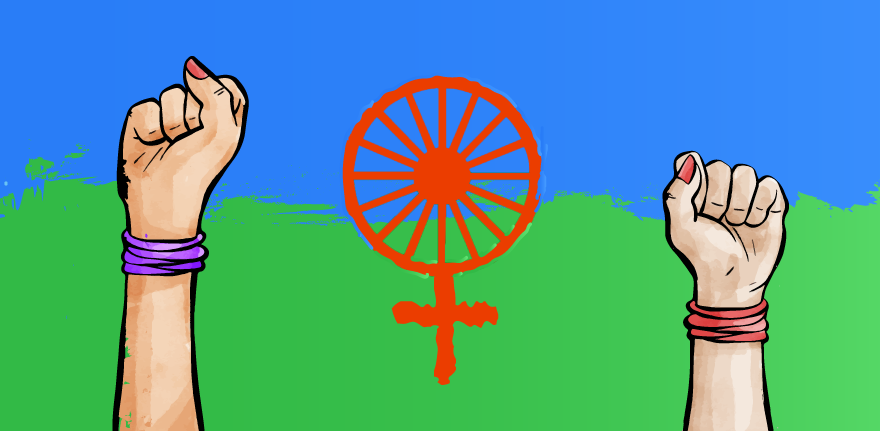We Romani Women...
25 November 2019
We Romani women…will not be defined by the violence which is done against us. On the International Day for the Elimination of Violence against Women, we Romani women would like to highlight a single persistent issue which prevents us from enjoying our basic human rights: Violence against women and girls. It is one of the most widespread, persistent, and devastating human rights violations in our world today. But the issue remains largely unreported due to the impunity, stigma, and shame surrounding it.
Violence against women and girls manifests itself in many ways. It is not only physical or sexual. Just as often the violence is psychological too, and in many ways can be just as devastating. The Declaration on the Elimination of Violence against Women defines violence against women as “any act of gender-based violence that results in, or is likely to result in, physical, sexual or psychological harm or suffering of women…” Romani women and girls must face the combined force of patriarchal and racist violence against them in all areas of their lives. From intimate partner violence – whether that be battering, psychological abuse, marital rape, or femicide – to institutional violence such as abuse in hospitals, police harassment, and even coercive sterilisation.
While gender-based violence can happen to anyone, anywhere, some women and girls are particularly vulnerable: young girls and older women; those who identify as lesbian, bisexual, transgender or intersex; migrants and refugees; indigenous women; and women from ethnic minorities. Romani women and girls must face the same violence which is directed at all women, with the additional burden of racialized violence from society and the state.
Many Romani women among us still suffer from “normalised” domestic violence, barriers in access to gynaecological care, financial dependence on men, and cultural shaming. An extensive survey carried out by a Bosnian Roma Women’s NGO found that out of 609 women interviewed, over 43 percent had suffered physical violence, while 76 percent knew a woman who had. Over 17 percent of women reported experiencing sexual violence. The survey findings also exposed the abysmal lack of support for Romani victims of domestic violence who had contacted the police, healthcare, or social services. One Romani woman said:
“I gave up calling the police… when we call them, they say - ‘Let it be, Gypsy business.”
Romani people are regularly amongst the most disadvantaged and most vulnerable people in society as a result of centuries of antigypsyism. For vulnerable Romani women and girls this means they are also more vulnerable to sexual violence and harassment such as unwanted advances, cyber-harassment, street harassment, sexual exploitation, rape, and child abuse. It means we are more vulnerable to human trafficking and slavery, to forced marriages, and to institutional harassment.
For those of us who happen to carry additional identities, other than our gender and ethnicity, the ways in which we are targeted only multiply. We cannot have a proper conversation about the situation of the Roma community in Europe without mentioning what it means to be a Romani woman facing intersectional discrimination. Many of us are discriminated against on account of our sexuality, our religion, our disability, our class, or any number of other identities which make us who we are in addition to our being Romani women. This creates a perpetual cycle of oppression for Romani women all over the world.
The consequences of violence against women and girls can affect us at all stages of our lives. Psychological abuse and disadvantages in early education are a primary obstacle to universal schooling and the right to education for girls. Later down the line they are also to blame for restricting access to higher education and even translate into limited opportunities for women in the labour market.
Undoubtedly, a Romani woman must battle through a maze of societal oppressions within her community and in society on a daily basis. From an early age we are subjected to pressures and discrimination from all sides, and all too often physical, sexual, and psychological violence is done to us. But we refuse to let this violence define who we are. We are aware that our Romani mothers, sisters, friends, and colleagues must face daily struggles to live a fair and equal life which is free from verbal and physical abuse. Today, we call on Romani women to take a stand and send a message that we refuse to stop fighting for our equality. We refuse to give in to racism and hate. We refuse to compromise on our rights. We refuse to be defined by the violence which is done against us.
#WeRomaniWomen call upon Governments to:
- involve a majority of Romani women in the drafting and implementation of policies that most concern them;
- end segregated education and set up training programmes for Romani women, with the aim of helping them secure better job opportunities;
- abolish health practices which infringe on standards of care for Romani women; provide health mediators, health information points and public health initiatives as a means of working towards reaching out to the Roma living in ghettos;
- extend or abolish the limitation period for the prosecution of forced sterilisations;
- encourage the promotion of social economy enterprises and support for business start-ups to facilitate the economic empowerment of Romani women, as a means to act against poverty and social exclusion;
- immediately cease unjustified and illegal forced evictions which disproportionately impact on Romani women and girls;
- set up an independent body for cataloguing systematic infringements of Romani women's rights through the formulation of ''white papers'', which would be drawn up in collaboration with independent Roma community organisations;
- fully ratify and implement the Istanbul Convention, to combat the vulnerability of Romani women and girls who are victims of violence.

 By Anikó Orsós
By Anikó Orsós


